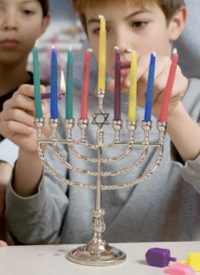
Poland has been historically one of the most serious Christian nations in the world. Lech Welesa, the leader of Solidarity, and Pope John Paul II honorably and effectively used this profound religious faith to bloodlessly end the Soviet occupation and control of the largest Warsaw Pact satellite. When Poland proved impossible for the Kremlin overlords to control, then the end of the “Warsaw” Pact — which could hardly exist without Warsaw itself — was certain.
The religiosity of Polish Catholics was matched by that of Polish Jews. In Germany, nominal Christians and nominal Jews largely abandoned real faith. Without God, totalitarianism finds fertile soil (a vital fact for Americans to absorb as our society increasingly embraces secular values.)
It should not surprise the world, then, that Poles proved willing to face death rather than submit to Nazi rule. In two separate uprising, the Warsaw Uprising of 1944 and the Warsaw Ghetto Uprising the same year, Polish Christians and Jews fought to the death Nazi occupation. During the Warsaw Uprising, Stalin ordered the Red Army to halt their advance into Poland. While Soviet tanks stood idle, while Soviet warplanes stayed on the ground, Stalin let his totalitarian rival ruthlessly slaughter the brave Poles.
In the Holocaust, which exterminated perhaps 12 million Jews and Christians, the Polish people suffered the most. While the Soviets were still allies of the Germans, early in war, deportation to near certain death in the Gulag followed soon after the Soviet occupation of eastern Poland; another one or two million Polish men, women, and children died in horrific conditions. As the savage armies of the godless Nazis and Soviets fought over Poland, it is hard to imagine how any Pole, Jew or Christian, could retain a faith in God. Yet they did.
My wife’s mother, a Jew in the Lodz Ghetto and later in Bergen-Belsen, never lost faith in her Blessed Creator. Polish Catholics, after all the horrors of war, of genocide, of brutal Soviet occupation, retained faith in Christ which enabled them to keep crucifixes in schools (even as our Supreme Court was banning God and prayer from schools). In the midst of the sadism, secularism, and sorrow, the God of Christians and of Jews stayed alive in the hearts of the Polish people.
How fitting, then, that President Komorowski of Poland, at Belvedere Palace, continued a tradition set by the late President Kaczynski and lit a candle of the Hanukkah menorah and distributed Hanukkah gifts to Jewish children on the first day of the Festival of Lights. “I am happy that you wanted to come to our home,” the President said, “that you come with what is beautiful in the Jewish tradition — with what brings people together.” Hanukkah is the Jewish holiday particularly connected with religious freedom and the long struggle to achieve that, a battle that Christians and Jews fight every day against a world which seems happiest sometimes when driving the Creator of the Bible into exile and forcing His children to worship in secret.
As Jehovah’s Witnesses face trial in Russia as an extremist group, and as Christmas decorations are banned in many Americans schools, it is inspiring that President Komorowski sees it as a fitting discharge of his state duties to celebrate religion in the palace of the Polish President. A holiday that Christ, as well as other Jews, would have celebrated two thousand years ago is celebrated today in Warsaw. The ACLU could not stop the people who fought and died in battles against the Soviets and the Nazis.



